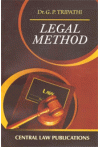- Author(s): Dr. G.P. Tripathi, Ajay Kumar
- Publisher: Central Law Publications
- Edition: 1 Ed Rp 2019
- ISBN 13 9789382676409
- Approx. Pages 740 + Contents
- Format Paperback
- Approx. Product Size 24 x 16 cms
- Delivery Time 3-5 working days (within Kerala & South India) (Others 7-9 days)
- Shipping Charge Extra (see Shopping Cart)
......................................................................................................................................
Description
Every discipline has its own contents and it is these contents that determine how these are to be studied. Social Sciences, Empirical Sciences and Behaviourical Sciences have independent ways for their study, teaching and research. Law is a discipline that shares contents with all. So it is studied in different ways. Social Science methods are made use of two teach core courses in Economics, Sociology, History and Political Science subjects which are relevant for analysis of the system of Governance and the Government. For preparing a litigation lawyer and litigation lawering basic and mathematics are must for preparing techno-lawyers so are management, human resource and finance/accounts mst as core courses for corporate lawyering; study of arts and humanities are must for transactional lawyering. The law education is more one of the learning about the law than memorizing the laws. Our legal system is so vast that no single person can be familiar with every law on the books, but most can learn to use the tools that lawyers and judges use for analysis, interpretation, and application of those laws. Knowing of the rules of law distinguishes a lawyer's approach to a problem from the layman's. Normally, legal education and training is task- specific; i.e., particular to an area of specialization. That focus is necessary and appropriate, but the novice requires a foundation of knowledge about the legal method—the tools-used, regardless of which area of law is involved. The object of this book is to distil law school experience and many years of practice) into a compact manual that describes how judges and lawyers, well, judge and lawyer. It specifically covers the intrinsic and extrinsic guides to statutory construction, the guides for analysis and use of case law, and the basic guides to contract interpretation, as well as what is implied. Its primary purpose is to explain the fundamental method of analysis of any legal issue by discussing the tools for extracting meaning from legal texts. This book describes methods or technique for working with law. Knowing how to use these techniques furnishes two major advantages to a lawyer or a law student. Studying legal technique provides rigorous intellectual training. Learning a good technique helps a student to learn law and a laywer to work with it in their professional life.
......................................................................................................................................
Table of Contents
Chapter 1 : Legal Methods
Chapter 2 : Legal Type ans Social Type
Chapter 3 : Theories of Law and Legal Method
Chapter 4 : Systems of Law and Constitutional Governance
Chapter 5 : Socio-Legal Method and Evolutionary theories Custom
Chapter 6 : Judicial Methods Precedent
Chapter 7 : Legislative Methods; Legislation
Chapter 8 : Interpretation of Statues; Legal Method to find out Sententia legis
Chapter 9 : Ownership of Property and of the Computer System
Chapter 10 : Property and Possession
Chapter 11 : Legal; Methods of Law Creating
Chapter 12 : Legal Right Concept, Analysis, and the right holder
Chapter 13 : Methods how law is executed organisation of Law
Chapter 14 : Methods of Law Relating
Chapter 15 : Alternative Dispute Resolution
Chapter 16 : Arbitration
Chapter 17 : Negotiation Method of Conflict Resolution
Chapter 18 : Conciliation
Chapter 19 : Mediation Whether a Facilitator
Chapter 20 : Lok Adalat and Legal Aid
Chapter 21 : Research methodology in aw
Chapter 22 : Globalization, Human Rights and Method of Law
......................................................................................................................................
Author Details
G.P.Tripathi, (D. Phil), Director, MATS Law school, MATS University, Raipur (Chhattisgarh)
Ajay Kumar, Associate Professor of Law Chanakya National Law University PATNA (Bihar)

